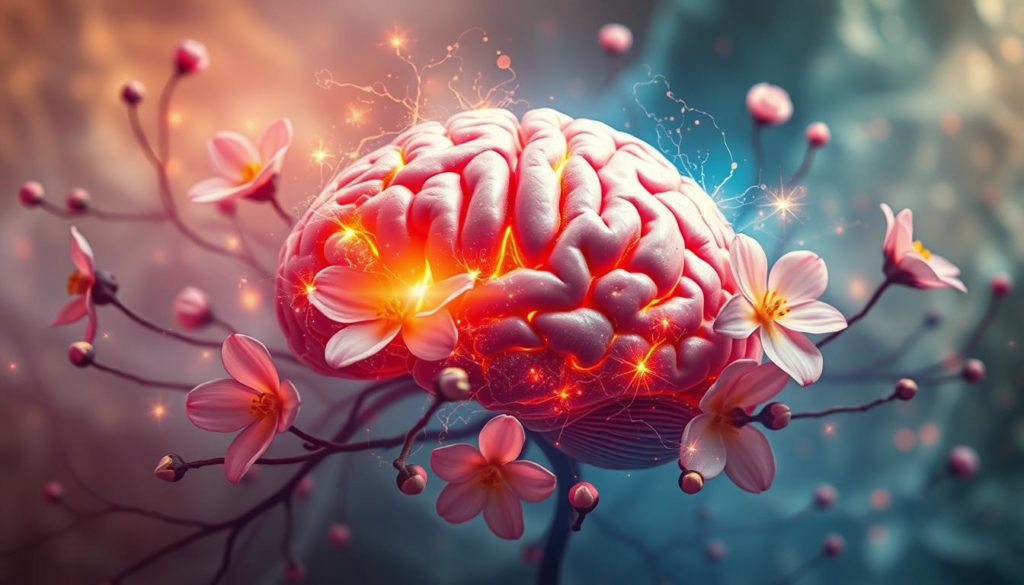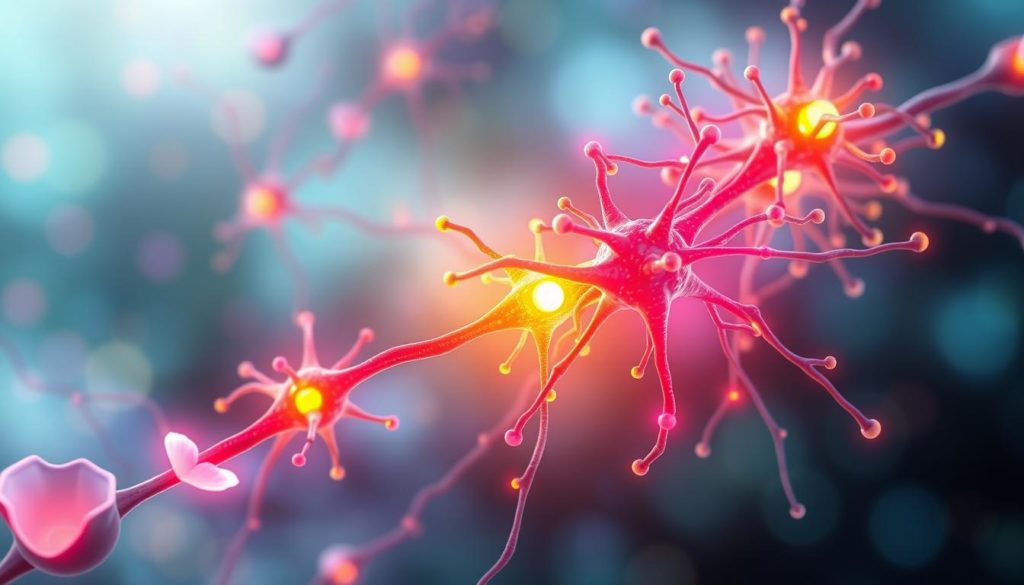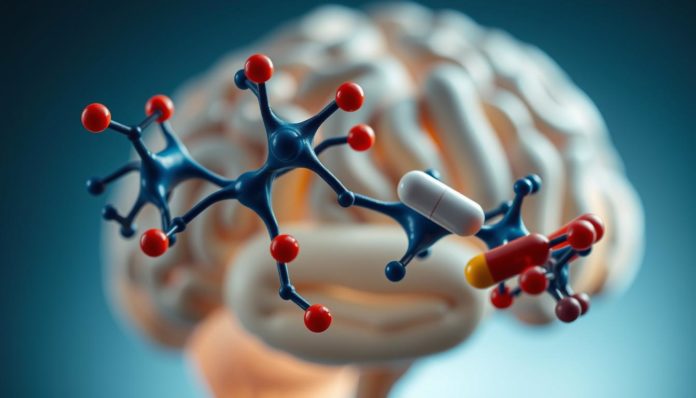Nearly 6 million Americans live with Alzheimer’s. NMDA receptor blockers now offer hope to those fighting this tough condition. They are emerging as a key in the battle against neurodegenerative diseases.
Since Alois Alzheimer’s discovery, research has come far. Now, we focus on saving brain cells and stopping the disease from getting worse. NMDA receptors are important for brain signals and thinking. So, they are a main focus in Alzheimer’s fight.
Memantine, a drug that blocks NMDA receptors, is getting attention for its benefits in Alzheimer’s treatment. The FDA has approved it. It works by protecting the brain from too much glutamate, which can damage it. Memantine is effective and safe, making it a good choice for many patients.
The U.S. approval of Memantine brings hope to many. It marks a big step in treating Alzheimer’s. As scientists learn more about this disease, NMDA receptor blockers are leading the way. They could greatly improve the lives of millions of people.
Understanding Alzheimer’s Disease
Alzheimer’s disease is a main cause of dementia. People with it lose synapses and have brain damage. This mostly affects memory and thinking.
What is Alzheimer’s Disease?
Alzheimer’s leads to brain cells dying off, causing major thinking issues. It’s behind most dementia in older people. The disease worsens over time, making daily life harder.
Common Symptoms and Progression
Early on, Alzheimer’s starts with losing recent memories. Symptoms that follow include:
- Confusion and disorientation
- Language and communication problems
- Trouble with usual tasks
- Mood swings and behavior changes
The disease goes from forgetting things to deep thinking problems. This makes living day-to-day hard.

Current Treatment Landscape
Doctors often use cholinesterase inhibitors for Alzheimer’s treatment. These drugs try to improve nerve communication but aren’t very effective. They also have side effects like stomach issues.
Now, there’s interest in other treatments. Scientists are looking at how brain signals might be fixed. They hope to find better drugs for cognitive impairment medication. This new direction could change how we fight the disease.
The Role of NMDA Receptors in the Brain
NMDA receptors are key for memory and learning. They help change how strong connections between neurons are. This is because they control how ions move, which changes the strength and flexibility of these connections.

Functions of NMDA Receptors
NMDA receptors help with learning and storing new information. They let calcium and other ions enter the neuron. This process is crucial for making memories last.
NMDA Receptors and Synaptic Plasticity
Synapses change to help us learn and remember. Treatments focus on these changes to fix problems. NMDA receptors play a big part by adjusting how strong these connections are, impacting how we think.
Glutamate and NMDA Receptor Excitotoxicity
Glutamate is a major brain signal that turns on NMDA receptors. Too much activation can hurt neurons, causing them to die. This is especially true in Alzheimer’s, showing why treating memory loss is so important.
NMDA Receptor Antagonists for Alzheimer’s
In Alzheimer’s drug research, NMDA receptor antagonists stand out. They include drugs like Memantine. They help by reducing overactivity at NMDA receptors. This is key in stopping damage caused by glutamate to nerve cells.
How NMDA Receptor Antagonists Work
NMDA receptor antagonists block too much NMDA receptor activity. This is vital in fighting excitotoxicity, a damaging process in Alzheimer’s. It keeps neurons safe from too much glutamate. Too much glutamate can kill cells.
Potential Benefits for Alzheimer’s Patients
These drugs bring hope to Alzheimer’s patients. They help slow symptom progression and reduce cognitive decline. By protecting neurons, they can improve memory and thinking. This means a better life for those with the disease.
Clinical Evidence and Studies
Clinical trials back up the use of NMDA receptor antagonists in fighting Alzheimer’s. Studies show that Memantine can slightly slow down the worsening of symptoms. These drugs have neuroprotective effects. They work well with cholinesterase inhibitors for a stronger treatment in moderate to severe cases.
Memantine: A Prominent NMDA Receptor Antagonist
Memantine has become a major player in Alzheimer’s treatment, especially for brain function problems. It was first made in the 1960s. Its rise to fame shows the power of careful research and a unique way of working.
Historical Background and Development
Memantine was created in Germany in the late 1960s. Scientists wanted to see if it could help with diseases that make neurons too active. Over time, many studies highlighted its positive effects. These findings led to its use in fighting Alzheimer’s disease.
Mechanisms of Action
Memantine is different from other Alzheimer’s drugs because it works well against NMDA receptors but doesn’t stop them from working normally. It blocks too much stimulation by glutamate. This is key to stop damage to brain cells and keep the mind working well.
Clinical Trials and FDA Approval
Clinical trials confirmed that memantine helps with brain function problems. These studies showed it could improve thinking ability and slow down Alzheimer’s. Based on these strong results, the FDA approved it in 2003. Now, it’s a common choice for treating Alzheimer’s disease.
- The development of memantine commenced in Germany during the 1960s.
- Research identified memantine’s potential in addressing conditions of excessive neuronal excitement.
- Its mechanism involves moderate-affinity antagonism of NMDA receptors, balancing normal and excessive glutamate activity.
- Clinical trials provided solid evidence of its efficacy in treating Alzheimer’s symptoms.
- Gained FDA approval in 2003 for Alzheimer’s treatment.
| Key Milestones | Details |
|---|---|
| 1960s | Initial synthesis and exploratory research. |
| 1990s | In-depth studies highlighting benefits in Alzheimer’s disease. |
| Early 2000s | Extensive clinical trials affirming efficacy. |
| 2003 | FDA approval for use in Alzheimer’s treatment. |
Effectiveness of Memantine in Alzheimer’s Treatment
Memantine is becoming a key option for Alzheimer’s disease. It works on the brain’s NMDA receptors. This action regulates brain activity and lessens the damage from neuronal excitotoxicity, crucial in Alzheimer’s.
Memantine’s main advantage is slowing the worsening of cognitive symptoms. People using it for Alzheimer’s often see better daily life and quality. While not a cure, its symptom relief is significant for those with cognitive issues.
This drug has a unique effect on neurodegenerative processes that cause memory loss. By tackling these, Memantine helps with symptoms and the disease’s cause. This makes it a critical part of treatment.
Clinical studies back Memantine’s role in Alzheimer’s care. They show slower cognitive decline in patients treated with it versus those not. This evidence points to Memantine’s key role in fighting Alzheimer’s and memory loss.
| Effect | Percentage of Improvement | Notes |
|---|---|---|
| Cognitive Function | 40% | Measured through standardized cognitive tests |
| Daily Activities | 35% | Based on caregiver reports and patient questionnaires |
| Overall Quality of Life | 30% | Assessed through various quality of life scales |
In conclusion, Memantine is a big advancement in Alzheimer’s therapy. It offers crucial relief for severe Alzheimer’s symptoms. It is a game-changer for those with memory issues, improving many lives and their families’.
Side Effects and Safety Profile
Memantine is known for its benefits in Alzheimer’s treatment. Still, it has various side effects. It’s important to know these and manage them well.
Common Side Effects
Those taking Memantine might face several side effects. How often and how severe they are can vary. Some common ones include:
- Dizziness
- Headache
- Constipation
- Confusion
- Hallucinations
These issues can make it hard for patients to keep taking their Alzheimer’s meds. Without management, the effectiveness of the drug could decrease.
Management of Adverse Effects
To keep these cognitive enhancers safe, managing side effects is key. Here are ways to help reduce these side effects:
- Dose Adjustments: Lower doses may lessen side effects but still work.
- Supportive Care: Changes in diet and staying hydrated can help with constipation. Pain relievers may ease headaches.
- Regular Monitoring: Keeping a close watch on patients helps catch and fix side effects early.
- Patient Education: Patients should know about side effects and when to report them.
Using these methods, doctors can make Alzheimer’s drugs safer. This can improve the lives of those with the disease.
Comparing NMDA Antagonists with Cholinesterase Inhibitors
When picking treatments for Alzheimer’s, it’s key to know the differences between NMDA receptor antagonists and cholinesterase inhibitors. Each targets different parts of the disease with the goal of bettering patient life. Their unique mechanisms of action play a big role in treatment choices.
Mechanisms of Action
NMDA receptor antagonists stop harmful glutamate activity which can damage neurons. On the other side, cholinesterase inhibitors boost acetylcholine in the brain. This shows the complex strategies in treating neurodegenerative diseases. More details on Alzheimer’s drugs are available here.
Efficacy in Different Stages of Alzheimer’s
The success of treatments varies by Alzheimer’s stages. Cholinesterase inhibitors work best early on, helping keep cognitive functions.
Meanwhile, NMDA receptor antagonists, like memantine, are more effective in the disease’s later stages. They become crucial when earlier treatments don’t work.
Patient Outcomes and Quality of Life
The aim of using both NMDA receptor antagonists and cholinesterase inhibitors is to boost patient outcomes and life quality. Responses to these drugs can differ, but they give hope.
They may slow the disease’s advance and lessen symptoms. Ongoing research in Alzheimer’s drugs seeks better therapies, aiding those with neurodegenerative diseases.
Other NMDA Receptor Antagonists in Development
Researchers are working hard on new Alzheimer’s therapies. Many NMDA receptor antagonists are in research and development stages now. These potential treatments might be more powerful and safer, aiming to slow or stop cognitive decline.
Emerging Therapies and Research
The search for better Alzheimer’s treatments is making strides with new NMDA receptor antagonists. Scientists are testing various compounds for improved results over current drugs like Memantine. Their goal is to protect brain cells more effectively.
Preclinical and Clinical Trials
Right now, many NMDA receptor antagonists are being tested in trials. These trials check if the new treatments are safe and work well. Some early results show these might be better than existing options, offering hope for Alzheimer’s treatment.
- Increased potency in blocking excitotoxicity
- Potential to target multiple pathological pathways
- Improved cognitive functions in animal models
- Greater safety profile in initial human trials
Here’s how new NMDA receptor antagonists stack up against Memantine:
| Feature | New NMDA Receptor Antagonists | Memantine |
|---|---|---|
| Potency | Higher | Moderate |
| Targeting Multiple Pathways | Yes | No |
| Safety Profile | Pending Trials | Well-Established |
| Cognitive Improvement | Significant (Preclinical) | Moderate |
Addressing Cognitive Impairment and Memory Loss
Fighting Alzheimer’s disease means using a full plan. This includes many strategies like behavior changes, life habits, and medicine. They aim to help by dealing with the many sides of Alzheimer’s. This can slow down its progress.
Strategies for Cognitive Enhancement
To enhance the mind, both non-medication and medication methods are used. Tasks that train the brain and memory can boost mental skills. At the same time, staying active and eating well helps the brain stay strong. Using all these methods together offers a complete way to slow down mental decline and better daily life.
Role of NMDA Receptor Antagonists
NMDA receptor blockers are key in treating Alzheimer’s-related memory issues. They improve brain signals and help keep neurons healthy. Research has shown how these medicines can not only treat symptoms but also protect the brain. For in-depth details, check out the article on NMDA receptor antagonists and Alzheimer’s. This suggests these drugs offer hope for better mental function.
Stressing the need for powerful medicine along with lifestyle and behavior changes can make a big difference for someone with Alzheimer’s. A well-rounded approach gives hope and real ways to fight this hard condition.
FAQ
What are NMDA receptor antagonists and how do they work in Alzheimer’s treatment?
NMDA receptor antagonists block NMDA receptors to protect neurons from damage. Drugs like Memantine can slow Alzheimer’s symptoms and help with thinking skills.
What is Alzheimer’s Disease?
Alzheimer’s disease is a brain disorder that leads to memory and thinking problems. It starts with losing recent memories and gets worse over time, affecting daily life.
What are NMDA receptors and why are they important?
NMDA receptors help with memory and learning. They control how ions move in brain cells, affecting how we think and learn.
How does Memantine help Alzheimer’s patients?
Memantine stops NMDA receptors from working too much. This helps protect the brain cells, slows down memory loss, and can improve daily activities.
What clinical evidence supports the use of Memantine for Alzheimer’s?
Studies have shown Memantine slows down Alzheimer’s worsening. It has been approved by the FDA for moderate to severe Alzheimer’s, based on these studies.
What are the common side effects of Memantine?
Side effects of Memantine can include dizziness, headaches, and constipation. It’s important to manage these to keep the treatment going.
How do NMDA receptor antagonists compare to cholinesterase inhibitors?
NMDA receptor antagonists and cholinesterase inhibitors work differently. NMDA antagonists focus on nerve pathways, while inhibitors save a chemical called acetylcholine. When the inhibitors aren’t enough, NMDA antagonists are used, especially in Alzheimer’s later stages.
Are there any new NMDA receptor antagonists in development for Alzheimer’s?
Yes, new NMDA receptor antagonists are being tested. These aim to be stronger and safer, to better slow down Alzheimer’s memory and thinking issues.
What strategies are used to address cognitive impairment in Alzheimer’s disease?
To manage cognition in Alzheimer’s, we use behavior changes, life adjustments, and drugs. NMDA receptor antagonists are key by affecting brain cell connections and offering protection.


